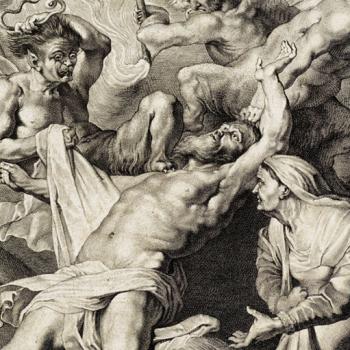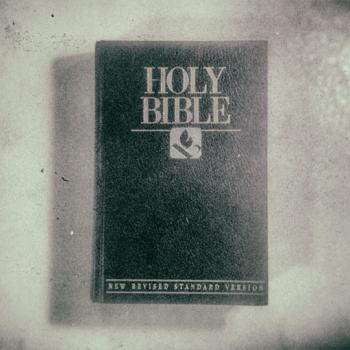
“If all are saved, then why follow Jesus?” is one of my least favorite inquiries. The question assumes that if there is no eternal hell awaiting those who fail to choose Jesus as their “personal Lord and Savior” in this life, then Jesus is not worth following. As if our primary concern as Christians should be the afterlife, rather than ushering in the at-hand kingdom of heaven. Ugh!
But, despite the annoyance this question causes me, let’s explore a few answers, shall we?
Answer 1: The Gospel Brings Peace
“As shoes for your feet put on whatever will make you ready to proclaim the gospel of peace.” ~ Eph. 6:15
“And the peace of God, which transcends all understanding, will guard your hearts and your minds in Christ Jesus.” ~ Phil. 4:7
In case you haven’t noticed, our world is shrouded in violence. Syria is a mess. Palestine is in shambles–so too are Afghanistan, Iraq, Turkey, Yemen, Libya, Somalia, Ethiopia, Honduras, Brazil, Mexico, and the list goes on. This list also includes my country, the United States of America. Even as I write this, the United States–a supposedly “Christian” nation, as I’m often told–just chose for its President a “Christian” man whose solution for defeating terrorism is, in part, to “take out their families,” over a “Christian” woman notorious for her pro-war voting record and dubious political dealings.
Some Christian nation!
On top of this precarious political situation, our city streets are also witnessing increased aggression, both from and toward police, and random acts of violence are becoming increasingly commonplace. It is overwhelmingly apparent that violence is getting out of control, and that at some point we will have to face a reaping of what we are currently sowing. The worst case scenario, of course, is that we may one day find ourselves booted the hell off our tiny blue dot, either because of nuclear destruction, a piling up of ecological disasters, or for any number of other self-inflicted reasons.
So, given what could be considered some pretty gloomy prognostications, don’t we need “saving” from a very real “something?” And isn’t that something violence? Isn’t the Gospel relevant when thinking about the real crisis humanity finds herself in?
You bet it is.
This is what the Gospel has been about from the start–a breaking into our time and space by God to show humanity what true humanness, as well as perfect theology, is all about: namely, divine shalom. Sadly, this beautiful news has been hijacked and is presented as a means to secure a blissful afterlife, rather a way to usher in the peaceful kingdom of heaven in the here and now. At its core, the Gospel isn’t about posthumous rewards, but about liberation from enslavement to the violent mechanisms of our world.
One of these mechanisms is the scapegoating of others, and we see it on full display in the Passion narrative, especially when former rivals—Pilate and Herod—unite around the death of Jesus. Luke 23:12 teaches: “That same day Herod and Pilate became friends with each other; before this they had been enemies.” That is how we keep peace in society, by coming together at the expense of an “other.” Indeed, it’s how the world was founded. Genesis 4:17 tells us that after Cain slew Abel, he “knew his wife,” and then immediately built a city—from a murder directly to civilization, human culture founded on blood.
The Passion exposes the futility of violence and offers a way out. That Way is the Way of forgiveness, even in the face of the violence of human culture. Luke 23:34 testifies to this when Jesus, naked from the cross, cries out “Father, forgive them; for they do not know what they are doing.” Jesus speaks to the non-conscious nature of our violent scapegoating—they do not know what they are doing—and then models, for all to see, how these powers and principalities shall fall. It will be through forgiveness, and it will be out in the open—“outside the city gate in order to sanctify the people by his own blood” (Heb. 13:12)—rather than in the Temple, behind the veil where sacrifices were generally made.
This is how “thy kingdom come” manifests on earth “as it is in heaven” (Matt. 6:10). Human kingdoms are structured around retributive violence, to the extent of even seventy-sevenfold—such as when Lamech boasts of murdering a child in Genesis 4:24–but the kingdom of God is established by forgiveness offered to one another seventy-sevenfold, as taught by Jesus Christ in Matthew 18:22, and then as modeled by him on the cross and after the Resurrection.
The Resurrection unveils the slain yet forgiving victim, who offers the same peace and forgiveness (John 20:19–23) he offered during his life (Luke 23:34). This is what the writer of Hebrews is getting at when he teaches that the blood of Jesus speaks a better word than the blood of Abel (Heb. 12:24). In Genesis 4:10, Abel’s blood cries for vengeance. But Jesus, both from the cross and then after, forgivingly cries for shalom, for peace.
Answer 2: Death Looms–Watching, Waiting
“So that through death he might destroy the one who has the power of death, that is, the devil, and free those who all their lives were held in slavery by the fear of death.” ~ Heb. 2:14b–15
All of us are destined to die, whether by some horrific event early in life or simply from the wearing down of our bodies. Frankly, this scares the living crap out of us. Pulitzer Prize-winning anthropologist Ernest Becker posited that this fear of death is the primary driving force behind humanity’s gruesome violence. Whether that is entirely true or not, death anxiety certainly enslaves our minds and causes us to behave in a way that is not at all becoming of the heavenly life–our fear of death can cause quite a living hell.
The Apostle Paul, in Romans 5, addresses this fear of death. In verse 12, we are told that Adam’s sin leads to death for all people. Then in verse 14 he writes how death even exercises dominion over us. Death and the fear it causes hold humanity in bondage, whereas Christ offers a life-giving gift (Rom. 5:17–18, 21). That is Paul’s point: what Adam did, Christ undid. Adam’s sin is undone by Christ’s free gift of grace, death is undone by Christ raised from the dead.
Christ’s resurrection shatters our fear of death, so much so that Paul, in his first letter to the Corinthians, describes death as being “swallowed up in victory” (1 Cor. 15:54). Paul is so confident that he even mocks death itself: “Where, O death, is your victory? Where, O death, is your sting?” (1 Cor. 15:55).
A bold proclamation indeed!
The early Christians, Paul included, were bold people. They took all sorts of unjust punishment. They were accused of cannibalism (for partaking of the Eucharist), accused of atheism (they would not bow to the Romans gods), scapegoated for a tragic fire that tore through first century Rome, and then butchered by the thousands. Their burning bodies were even used to light up the night sky during Caesar Nero’s wild and noxious orgies. Yet they remained true to Christ, their Master. They forgave; they opened their homes to one another, living wholly for the “other.” They lived as if they had already died with Christ (Col. 3:3). And because Christ had been raised, so were they. That is what living in the post-baptized reality is all about.
O, death, where is thy sting? Indeed!
Those who suggest that without an eternal hell there is no reason for Jesus need to realize that death and our fear of death are enough of a hell to be saved from. Eternal torment is a man-made thing, but death is the true plight facing humanity. It is through Christ’s corporate undoing of the death caused by the sin of Adam that we are able to find life in the most abundant of ways, starting here and now, and then on into the forever.
Answer 3: Jesus Asks Us To
This is the most “duh-worthy” answer of the three. No matter what we believe about eschatology, soteriology, or any of the other “-ologies,” doesn’t Jesus simply ask us to follow him, period? The Bible is clear about this (all emphasis mine):
- Matt. 4:19: “And he said to them, ‘Follow me, and I will make you fish for people.’”
- Matt. 16:24: “Then Jesus said to his disciples, ‘Whoever wants to be my disciple must deny themselves and take up their cross and follow me.’”
- Matt. 19:28: “Jesus said to them, ‘Truly I tell you, at the renewal of all things, when the Son of Man sits on his glorious throne, you who have followed me will also sit on the twelve thrones, judging the twelve tribes of Israel.’”
- Mark 10:21: “Jesus, looking at him, loved him and said, ‘You lack one thing; go, sell what you own, and give the money to the poor, and you will have treasure in heaven; then come, follow me.’”
- John 8:12: “Again Jesus spoke to them, saying, ‘I am the light of the world. Whoever follows me will never walk in darkness but will have the light of life.’”
- John 21:18–19: “‘Very truly, I tell you, when you were younger you used to fasten your own belt and to go wherever you wished. But when you grow old, you will stretch out your hands, and someone else will fasten a belt around you and take you where you do not wish to go.’ (He said this to indicate the kind of death by which he would glorify God.) After this he said to him, ‘Follow me.’”
The “following” that Jesus calls us for is crucial. Given our mimetic (imitative) nature, we all follow someone, consciously or non-consciously. In doing so, we engender rivalries and violence, because we all want what the other has, and because we all cannot have it, it becomes simple mathematics.
Think of the opening scene from Lord of the Rings: The Return of the King. Two brothers, Smeagol and Deagol, are fishing in a river, when Deagol gets dragged down by a real lunker of a catch. While under the water, he discovers the infamous ring. Once at the surface, Smeagol arrives and then senses Deagol’s deep desire for the ring. Sure enough, the two then get into a knock-down-drag-out fight in which Smeagol slays Deagol. We humans do the same thing to each other any time something shiny comes our way. We can’t help ourselves. Our desires become so twisted that we lose our humanity and will often stop at nothing to acquire them. We’ll even slay our own brother or sister if we have to.
The Hebrew Bible also speaks to this in its founding murder myth. Cain slays Abel because he desires what he believes Abel has, namely God’s blessing (Gen. 4:3–5). The mimetic rivalry that is fueled by the brothers’ shared desires brings a lurking of sin to Cain’s door (Gen. 4:7). Cain lets sin enter one verse later, when brother rises up against brother, spilling the first human blood. The Bible speaks truth to power here, soberly yet accurately depicting how all of human culture is founded on blood.
Jesus, however, refuses to enter into mimetic rivalries with others. He doesn’t do this because he is God, or because he has superhuman abilities (Docetism), but because he knows the Father’s heart. Remember, he was able to “defeat” his dark side while in the wilderness (Luke 4:1–13), thus denouncing anything from within himself that would potentially contradict the will of the Father. On numerous occasions, the writer of John’s Gospel then gives an account of the bond between the Son and the Father:
- John 5:19–20: “Jesus said to them, ‘Very truly, I tell you, the Son can do nothing on his own, but only what he sees the Father doing; for whatever the Father does, the Son does likewise. The Father loves the Son and shows him all that he himself is doing; and he will show him greater works than these, so that you will be astonished.’”
- John 6:38: “For I have come down from heaven, not to do my own will, but the will of him who sent me.”
- John 8:28: “So Jesus said, ‘When you have lifted up the Son of Man, then you will realize that I am he, and that I do nothing on my own, but I speak these things as the Father instructed me.’”
- John 10:29: “What my Father has given me is greater than all else, and no one can snatch it out of the Father’s hand.”
- John 12:49: “For I have not spoken on my own, but the Father who sent me has himself given me a commandment about what to say and what to speak.”
What Jesus reveals about the divine is that divinity possesses no violence. God is a life-giver—only. God’s perfection is described primarily by his love and mercy (Matt. 5:38 and Luke 6:36). In fact, God is love itself (1 John 4:18). He is also light and in him there is no darkness (1 John 1:5). This includes the darkness of mimetic rivalry, the very darkness that plagues humanity and drives us to such retributive violence.
This darkness is purely a human thing.
We witness it quite clearly in the back and forth between Jesus and Peter from Matt. 16:21–23. Notice how, after Jesus foretells of his own death, Peter attempts to persuade Jesus to do contrary to what the Father was having him do. It is as if Peter is saying “no” to following Jesus and instead, desires Jesus to follow him. René Girard offers great insight into how a rivalry could have been born during this event:
Instead of imitating Jesus, Peter wants Jesus to imitate him. If two friends imitate each other’s desires, they both desire the same object. And if they cannot share this object, they will compete for it, each becoming simultaneously a model and an obstacle to each other. The competing desires intensify as model and obstacle reinforce each other, and an escalation of mimetic rivalry follows; admiration gives way to indignation, jealousy, envy, hatred, and, at last, violence and vengeance. Had Jesus imitated Peter’s ambition, the two thereby would have begun competing for the leadership of some politicized “Jesus movement.” Sensing the danger, Jesus vehemently interrupts Peter: “Get behind me, Satan, you are a skandalon to me. René Girard, “Are the Gospels Mythical?” First Things, April 1996, para 10.
Jesus understands the temptation of taking on a model other than the Father (Luke 4:1–11). He understands how enticing the satan can be and recognizes it as skandalon, or a stumbling block. In this case, it is Peter’s desire to have Jesus follow him that is the skandalon personified—Satan! If Jesus would have followed Peter, the nonviolent Christ-mission would have failed and the two would have entered into a rivalrous situation, one that would have potentially escalated toward overt violence, either among Jesus and Peter and the disciples, or with those in Jerusalem where Jesus would soon be going, or both.
This is why following Jesus is so important. Because we cannot turn off our mimetic desires, we instead must imitate the desires of a figure that only does the will of the non-rivalrous Father. That figure is Christ Jesus. It is he who can lead us, en masse, into the kingdom of heaven. It is he who can expose humanity’s negative mimesis, and then he who models how to replace that with positive imitation—non-consciousness replaced by a higher consciousness.
It may not be a simple task, but it is the Christian calling—or “election,” if you will. And because this Way of life is not an easy one, crosses must be carried daily (Luke 9:23), as it remains a daily struggle for most people, including myself. But since Jesus asked this of us, and then showed us exactly how to do it, it is exactly what we should do.
For further study, I recommend:
- Engaging the Powers: Discernment and Resistance in a World of Domination by Walter Wink
- I See Satan Fall like Lightning by René Girard
- The Denial of Death by Ernest Becker
- The Jesus Driven Life: Reconnecting Humanity with Jesus by Michael Hardin
- The Slavery of Death by Richard Beck
Photo via Unsplash.
 About Matthew Distefano
About Matthew Distefano
Matthew Distefano is the author of All Set Free: How God is Revealed in Jesus and Why That is Really Good News and the newly-released From the Blood of Abel. He is also a Regular Contributor for The Raven ReView and ProgressiveChristianity.org. You can find him on his website, Facebook, and Twitter.












